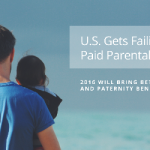These Are The Best Places To Work For New Fathers
What a difference a year makes—especially for new parents.
And just like the changes that come as an infant grows into a toddler, Fatherly, an online platform with parenting resources for dads, has documented the evolution of paid family leave in America. While only New York passed paid family leave legislation this year (making it the fifth state in a patchwork of policies), individual businesses have made greater strides for fathers.
In 2015, nearly half of Fatherly’s 50 Best Places To Work For New Dads offered between one and two weeks of paid leave to fathers. This year’s survey finds that the average is up to 7.5 weeks and 35% of companies offer between six and eight weeks. A dozen others pushed that to 10 weeks and a full year.
As evidenced by the top three companies (Netflix, Spotify, and Facebook), Fatherly’s analysis suggests that the movement to offer more time off was set off by the talent wars in the tech industry. Millennials have been more vocal in demanding to be part of their children’s first months, and the industry has responded with extended benefits in order to attract these hires.
Progress among tech companies alone isn’t actual progress, the analysts note. Fatherly’s list has 17 businesses that are listed as technology companies and the remainder span industries from hospitality and retail to banking and biotech. However, all but a handful of the top 50 have staffs smaller than 5,000. With over 99% of U.S. businesses employing fewer than 500 people, offering paid leave can be a challenge. But Fast Company recently reported on a group of these small firms that maintain the cost of not offering a paid leave policy is greater than the outlay to bridge the temporary gap of covering the employee while they take time off.
Paid leave is just part of the equation for new parents. Fatherly’s cofounder Simon Isaacs notes that in a survey done in partnership with Plum Organics in February, 90% of dads reported that paid leave was important, but found that rather than take leave all at once, most (75%) of dads would like to take that leave flexibly, so they can balance responsibilities with their spouse. Flexibility is also extremely important for dads. “The vast majority of dads (85%) use flex time to take care of their family,” he tells Fast Company.
Not all dads take the time off, though. Isaacs says that those fathers fortunate enough to work at a company with extended leave, many haven’t taken full advantage of the benefits because of the perceived threat to their career.
Michael Marty, SVP & GM of Care@Work, Care.com’s enterprise arm working with corporate leaders to support their working families, blames this on the absence of a blueprint for fathers to balance work and family. “Unfortunately, societal ‘rules’ around shared parenting responsibilities haven’t kept pace with society,” says Marty. He cites research from Boston College indicating that 99% of working fathers felt their supervisors expected no change to occur to their work patterns after becoming a new parent. “Dads tend to be underrepresented,” says Marty, “They need permission to participate and break societal ‘rules.’”
More male leadership speaking openly about shared family responsibilities will help, says Marty. Isaacs concurs. “With leaders such as Mark Zuckerberg taking and talking about their leave and companies big and small stepping up to make paid parental leave a priority, more dads than ever are taking extended paid paternity leave,” says Isaacs.
“Dads are incredibly conflicted,” Isaacs adds. The numbers bear this out. More than 75% of working dads want to advance and have greater responsibilities in the workplace, Isaacs observes, but more than half of men would be willing to stay at home provided their spouse makes enough money, he explains.
The bigger challenge at the moment is work/life balance for new parents, says Isaacs. “Fathers stress over work/life balance more than college savings or career advancement, yet they are self-censoring these concerns,” Isaacs says. However, he notes, 77% of parents wouldn’t bring up the issue with their employer.
The good news, according to Isaacs, is that workplace attitudes around rights and responsibilities when it comes to paid leave are changing—especially at large companies. “We still have a long way to go for those who work in small businesses and independent workers, a group that represents 99% of workers,” he says. “To move that, it’s about shifting and shaping culture—from leading influencers and businesses to media.”
CORRECTION: Fatherly had mistakenly reported Bank of America’s paid leave policy as 12 weeks in a previous version of this article. It is 16 weeks and ranked number five.
Fast Company , Read Full Story
(18)















